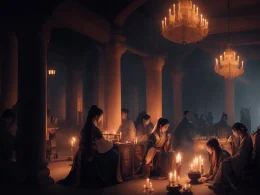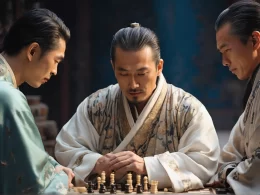Idiom Explanation:
Originally, it refers to the building of a tall mountain, which could not be completed because of the last basket of soil. Later, it is used as a metaphor to describe the failure to complete something with only the last bit of effort.
Pronunciation:
功亏一篑
gōng kuī yī kuì
Origin:
《尚书·旅獒》:“夙夜罔或不勤,不矜细行,终累大德。为山九仞,功亏一篑。”
Story:
In the 11th century B.C., Ji Fa, the second son of King Wen of Zhou, was able to take the throne after his brother Bo Yi Kao was brutally killed by King Zhou of the Shang Dynasty. After his death, Ji Fa was given the posthumous title of "Wu", and became the founder of the Western Zhou Dynasty when he succeeded his father, King Wen of Zhou, and overthrew the Shang Dynasty. After succeeding to the throne, Ji Fa continued to actively prepare for the destruction of the Shang Dynasty, appointing Jiang Shang as his military advisor and in charge of military affairs; appointing his brother Zhou Gong Dan as his assistant and in charge of government affairs; appointing Duke Zhaogong and Duke Bi as his assistants.
After a fierce battle between the Shang and Zhou armies at Muye, the Shang army was routed and King Zhou fled back to Yindu and burned himself at the Deer Terrace. King Wu of Zhou destroyed the Shang Dynasty and established the Zhou Dynasty. Small vassal states from all over the world came to congratulate him and brought many local specialties and precious gifts. At that time, a Xiongnu state, which was located in a remote place, also sent an envoy and a famous dog as a gift. It was a unique dog of Xirong, four feet in height, with a large tail and abundant hair, very rare.
Zhaogong, who served as the governor, was afraid that King Wu of Zhou would lose his will by playing with things. One day, he met with King Wu of Zhou and said to him, "Now, the West is all attached to you, and all the countries near and far have contributed their good things to you, which is certainly your holy virtue. However, there is no distinction between noble and lowly things for pleasure, but the key is the virtue of people. Without virtue, things are not worth anything; with virtue, things are precious. A virtuous ruler should not indulge in the pleasures of the world. If a person treats people as playthings and teases them, he will lose his virtue; if he treats precious things as treasures and plays with them every day, he will lose his ambition. If a man treats a rare thing as a treasure, he will lose his ambition. It is better to distribute the things contributed by the four parties to the countries of the same surname as a token of faith and sincerity."
Seeing that King Wu of Zhou was listening attentively, Duke Zhaogong continued, "A wise ruler should set an example and set a good example for his ministers, pay attention to his words and actions at all times to see if they are in line with the norms, and never neglect the smallest acts. This is like building a hundred-foot-high mountain of earth, which has to be piled up basket by basket. When the pile is almost complete, just add one more basket, and you're done. But this last basket of soil is not piled up, this hundred-foot-tall mountain is not completed, is not too regrettable? We must not lose the whole thing. You are a wise ruler, you can't make such a mistake! Otherwise, it will be too late to regret ……"
After listening to Zhaogong's advice, King Wu of Zhou found it very reasonable and concentrated more on ruling the dynasty from then on.
Similar Idioms:
- 功败垂成
- 前功尽弃












